Published Sep 14, 2025 | 12:25 PM ⚊ Updated Sep 14, 2025 | 12:25 PM
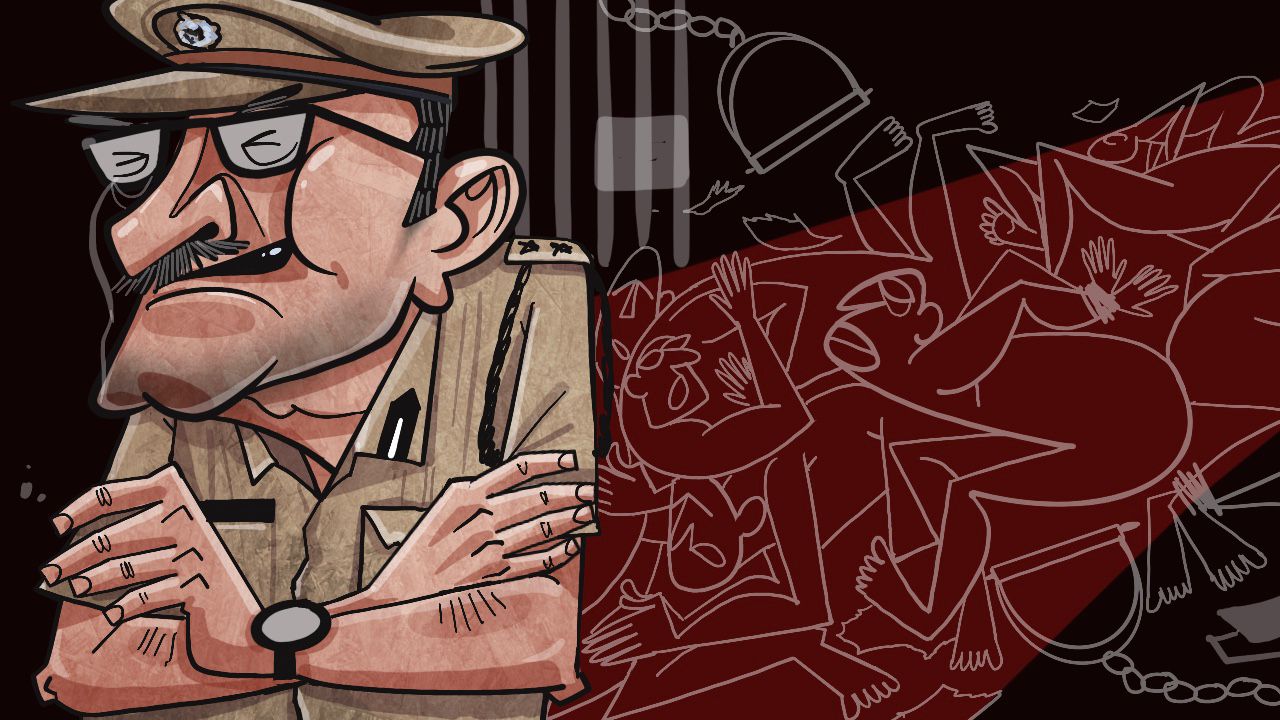
The Kerala Police stands at a crossroads. On one side, it's a force celebrated for its efficiency, and on the other, it is shadowed by recurring allegations of abuse.
Synopsis: Recently, the image of the Kerala Police has been marred with an increasing number of allegations regarding custodial torture, abuse of power and brazen intimidation. On one side, it’s a force celebrated for its efficiency, and on the other, it is shadowed by recurring allegations. Chief Minister Pinarayi Vijayan consistently lecture the state police on integrity, discipline and accountability. Yet, these pronouncements are increasingly seen as hollow words cloaked in secrecy.
In Kerala, the police swear by the maxim “Mridu Bhave, Drida Krithye” — gentle in nature, firm in duty. Yet for many ordinary citizens, the reality is far harsher: Encounters with the khaki often leave behind scars of fear, not faith.
Each passing day peels back another layer of rot — custodial torture, abuse of power and brazen intimidation.
With the chief minister doubling as home minister but offering little more than platitudes, and bodies like Kerala State Police Complaints Authority stripped of their bite, one question echoes louder than ever in the state: When the protectors turn predators, who dares to hold them accountable?
From the day he assumed office in May 2016, Chief Minister Pinarayi Vijayan rarely missed any opportunity to lecture the state police force on integrity, discipline and accountability.
He warned the force of “strict action” against corruption, “zero tolerance” for custodial excesses, and “uncompromising measures” against those tarnishing the uniform.
Yet, years later, these pronouncements are increasingly seen as hollow words cloaked in secrecy.
Back in July 2016, while addressing the Kerala Police Service Officers’ Association in Kochi, Vijayan made his first major remark on the force: “There is corruption in the police. It is a very serious issue… Strong action would be taken against those who indulge in corruption.”
Three years later, in June 2019, following custodial torture and mounting criticism, he declared that “excessive acts by the police will never be allowed.”
Similar assurances followed during his second term, including a vow in October 2022 — after alleged brutality against two brothers in Kollam — that action would be taken against erring officers.
In May 2023, at the Kerala Police Officers’ Association conference in Angamaly, the chief minister again warned that officers “unable to change with the times” would be brought before the law.
In December 2024, he went a step further, acknowledging that societal “wrong habits” seep into policing, and promised “strict, uncompromising action” against errant personnel.
However, the consistent thread in every speech was his reassurance: “Nothing will be done to destroy the morale of the police.”
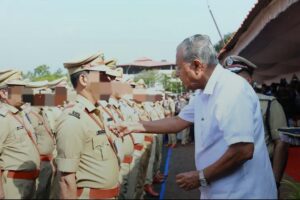
CM Pinarayi Vijayan presenting the badge of honour to police officials
That very assurance has now become the government’s escape clause.
In January this year, it emerged that 14 personnel, including two Deputy Superintendents of Police (DySPs), who had been suspended for alleged links with anti-social elements, were quietly reinstated to service.
Officials also admitted that at least 18 personnel with such tainted backgrounds are currently in the force.
Meanwhile, in the Assembly (on 3 March and 24 March this year), Vijayan evaded direct questions about how many police personnel face criminal cases, how many have been punished, and how many are still under trial.
For a chief minister who made police reforms one of his earliest promises, the contrast between rhetoric and reality has never been starker.
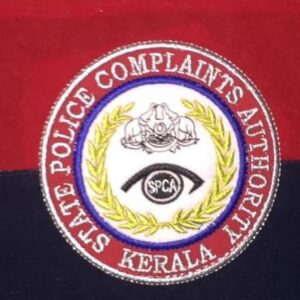
Kerala State Police Complaints Authority
When the Supreme Court of India, in its landmark Prakash Singh & Ors vs Union of India & Ors judgment of 2006, mandated the creation of Police Complaints Authorities (PCAs), the idea was to provide an independent mechanism to hold the police accountable.
These bodies were tasked with investigating serious misconduct — deaths, custodial violence, rape, extortion, or any grave abuse of power.
Kerala followed suit by incorporating the authority into Section 110 of the Kerala Police Act, 2011, and it came into being in 2012.
At the state level, the authority was to be headed by a retired high court judge, supported by senior bureaucrats, police officers, and nominees recommended in consultation with the Leader of Opposition in the state Assembly.
District-level PCAs were also envisaged to address complaints against officers up to the rank of Deputy Superintendent of Police.
Importantly, both state and district authorities were given powers equivalent to a civil court during inquiries. On paper, the framework appeared strong. In practice, it has turned into little more than a paper tiger.
Despite its mandate, the State Police Complaints Authority can only make recommendations. It has no enforcement powers, leaving its findings dependent on the government’s will. Critics argue this has reduced the institution to a “powerless bystander.”
Even the Kerala High Court’s directive to appoint a Chief Investigating Officer (CIO) — a step meant to ensure impartial probes into custodial violence and misconduct — remains unimplemented, despite repeated reminders.
Even though the Home Department periodically issues notifications inviting applications for the CIO post, there is still no clarity on whether the post has ever been filled.
The apathy is striking, given that the Supreme Court had earlier directed all states to appoint such independent officers to ensure impartiality and justice for victims of police atrocities.
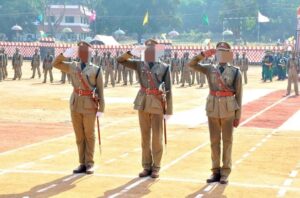
Police officials
Since its inception in 2012, the Kerala State PCA has received 5,218 complaints and disposed of 5,152.
The year 2017 saw the highest number of complaints at 808, while 2024 recorded a low of just 94.
So far this year, 45 complaints have been filed, with 14 still pending.
Authority chairman Justice VK Mohanan insisted that there has been “no pattern of widespread police crime” in Kerala.
“The authority has powers only to make recommendations based on the complaints it receives. All complaints with legal validity have been resolved,” he told the media.
Yet, many argue the declining number of complaints reflects not improved policing, but a loss of faith in the authority itself. Citizens increasingly view it as a body with no real bite — “a watchdog that failed to bark.”
At the same time, the Commonwealth Human Rights Initiative (CHRI), an independent international NGO, criticised Kerala for violating Supreme Court directives on the composition of Police Complaints Authorities at the state and district levels.
In its 2011 report, CHRI noted that while the apex court mandated full-time, independent members for such bodies, Kerala’s Authorities are dominated by serving government officers.
At both the state and district levels, key positions are held by top bureaucrats, police officials, Collectors, Commissioners and DySPs, leaving little scope for independent oversight.
The report warned that this arrangement not only contravenes the court’s order but also undermines principles of natural justice by creating a risk of bias.
CHRI observed that even a progressive state like Kerala has “completely subverted” the directive by appointing serving police officers to positions where impartiality is paramount.
Police officials accused of misconduct often attempt to shield themselves under Section 197 of the CrPC, which is now Section 218 of the Bharatiya Nagarik Suraksha Sanhitha, claiming their actions were carried out “in the discharge of official duty.”
This provision requires prior sanction to prosecute public servants for such acts, giving errant officers a convenient escape route.
However, both the Supreme Court and the Kerala High Court have repeatedly clarified that this protective cover cannot extend to custodial torture or abuse of power.
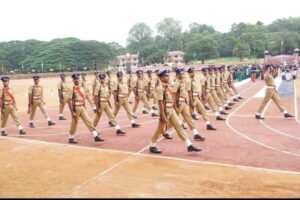
A passing out parade
Earlier, Justice Kauser Edappagath of the Kerala High Court held that inflicting torture on an arrestee can never be considered part of a police officer’s official duty.
The court described custodial violence as one of the gravest crimes in a civilised society, warning that unchecked police excesses threaten the very foundations of the justice system.
The judgement underscored that unless stern measures are taken against such misconduct, it would embolden officers to act as if they are above the law, turning them into a “law unto themselves.”
It called for courts to approach these cases with realism and sensitivity, noting that police brutality tarnishes the image of the nation and undermines public trust in the rule of law.
Despite repeated circulars from the State Police Chief urging personnel to behave lawfully and courteously with citizens, little has changed on the ground.
A serving officer admitted to South First on condition of anonymity that many policemen believe fear, not respect, ensures compliance, often resorting to threats, abuse, or even physical assault.
Meanwhile, the Kerala Police Association has pushed back strongly against what it terms “malicious propaganda,” pointing to the force’s high conviction rate — over 90 percent overall and 96 percent in drug cases — and its recognition by the Indian Police Foundation as the least corrupt in the country.
The association highlighted a steep drop in complaints filed with the Police Complaints Authority, from over 600 annually a decade ago to below 150 in recent years, questioning why isolated incidents are being amplified to tarnish an institution that handles lakhs of cases annually.
Meanwhile, mounting complaints of police excesses have triggered sharp political ripples in Kerala. The CPI, a key LDF ally, broke ranks with the government by voicing concern through its mouthpiece Janayugom, warning that incidents of police atrocity risked overshadowing the pro-people policies of the Left regime.
The editorial stressed that complaints of brutality under a Left government cannot be taken lightly. It also reminded that Chief Minister Vijayan had once sounded a stern note, asserting that anyone who sullies the credibility of the Kerala Police has no place in the force, and promising strict action against those who treat citizens with disdain.
Yet, in a show of solidarity, the CPI at its Alappuzha state meet lauded the force as the country’s best.
Sensing political opportunity, the Congress mounted state-wide protests against “police high-handedness, custodial torture, and corruption,” even as fresh accounts of misconduct surfaced across media platforms.
The LDF, however, pushed back, with CPI(M) leader MV Jayarajan reminding that it was the Left that ended Congress’s “police raj” in 2016.
Cultural Affairs Minister Saji Cherian accused the Opposition of cherry-picking stray cases to deflect attention from its own scandals, including allegations of sexual misconduct and misuse of relief funds.
The Kerala Police stands at a crossroads. On one side, it’s a force celebrated for its efficiency, and on the other, it is shadowed by recurring allegations of abuse.
The question before it is: Can it align its proud policing traditions with the rights and dignity of the citizens it is sworn to protect?
(Edited by Muhammed Fazil.)

